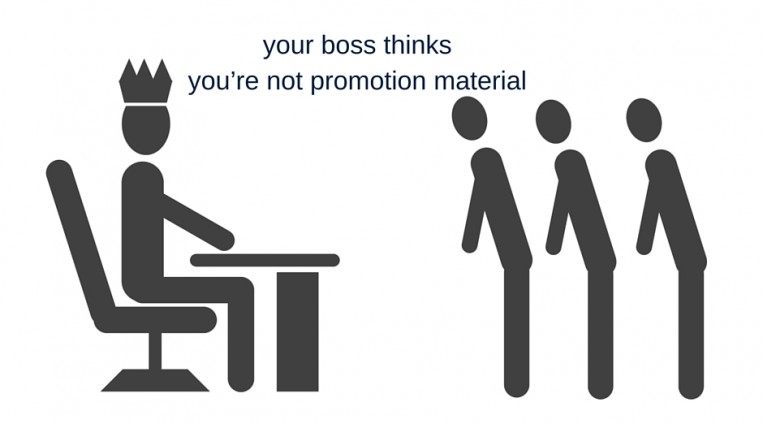
Getting even closer to your next promotion: 4 great examples of goals for employees in performance reviews

Getting even closer to your next promotion: 4 great examples of goals for employees in performance reviews
In my last post, in which I addressed looking at your corporate development career path, I wrote quite a bit about the importance of annual performance reviews. Their significance can be seen through the generous funneling of resources allocated to ensure their success. Though many mid-level managers see being the object of review as appealing as a visit to the dentist, I want you to view it as an excellent opportunity to advance your career. But you have to prepare in advance. Here are some classic examples of goals for employees in performance reviews that should help you along the way:
Goal 1: Determine the deliverables.
Treat your performance review as you would any other professional project in which you’d expect tangible deliverables. After a performance review, you should expect deliverables to include both information you want your boss to know (e.g., Am I up for promotion? When?) as well as information you want from your boss (e.g., I’m not happy with the pace of my career, compensation package, etc.).
Goal 2: Draw the line.
This one gets a little hairy, but if you stick with me, it’ll be worth it. You know that if you’re looking to get promoted, you’ll have to actually say it at some point during your annual performance review. You might even practice a key phrase, such as, “I feel it’s time for me to get promoted”. And during the review, you might even muster up the courage to actually say it...and then you’ll let out a sigh of relief because you did it without breaking out into a terrible sweat. But this whole scenario doesn’t seem right, does it? You’re right. And this is why you have to strive towards formulating two messages: one above the line and the other below the line.
Just like in marketing, an above the line message would be an explicit statement, such as requesting a promotion within a certain period of time, for example, two years. But a below the line message requires a bit more skill. Let’s say you’ve decided that if you don’t get a promotion within two years, you’ll leave the company. If you were to state this as an above the line message, you’d find yourself offered a cardboard box before you finished the sentence. However, to strengthen your original above the line message, it would still be beneficial to let your boss understand your seriousness about your two year limit. I’ll cover how to do deliver this below the line in the next step.
Goal 3: Look up.
The best way to explain how to formulate a below the line message is by giving an example. Taking the scenario in Goal 2, you might mention to your boss that so far, you’ve made sure to get promoted about every four years and that in two more years, you’ll have been in this current position for four years already. Your boss isn’t stupid. They’ll know exactly what you mean. And at the same time, you won’t have seemed disrespectful or unappreciative. So now let’s return to your above the line message.
Goal 4: Don’t look down.
As I’ve described above, you’ve managed to get that fateful phrase out of your mouth and now you’re finally relieved. Good job, but you’ve only done (really less than) half the job. Don’t worry, you don’t have to repeat what you’ve just said. Your boss heard it. But now it’s up to you to make sure they act on what you’ve said. This can be done simply with a follow up phrase as simple as, “What do you think about this”. Something this short will force your boss to relate to what you’ve said and provide you with an answer - even if it’s tentative. Without this little follow-up, your career goals remain in the air with no one taking any responsibility. So don’t look down - look up...and ask.
Conclusion
I hope you’ve understood the great potential annual performance reviews can have for you. With the right kind of goals and preparation, a review with your boss can bring you a few steps closer towards your corner office. By the way, you might find my post last post about the importance of corporate development career path planning helpful as well.
Good luck!
And always remember:
Great managers are made. Not born.
get your weekly free blog update
Check out these 2 important tips for your annual performance review.

It’s that time of the year again. Check out these 2 important tips for your annual performance review.
Every year the world over, annual performance (aka “feedback,” “assessment,” or ”appraisal”) reviews take place right around this time of year. In many organizations, reviews are a formal affair, while in others they are more casual.
What’s for sure is that over the last two decades or so, annual performance reviews have developed into both an art and a science, with companies pouring in their confidence, training and budgets into the process.
So it’s no wonder that stakeholders all around - executive managers, middle managers, and employees - take annual reviews seriously - so seriously that organizations tend to suffer from a pretty nasty case of the jitters during review season.
Performance reviews usually involve two “players.” On one hand are the obvious “targets” of the review - you. You’re the one being appraised by your direct supervisor. So it’s understandable that you might experience anxiety, as being reviewed can feel like stepping onto a shooting range with all guns pointed directly at you. But what many people don’t realize is that reviews can be just as stressful for those handing out our decrees. Realizing that every word supervisors utter is going to be scrutinized and analyzed by us, they have the almost impossible task of providing a year’s worth of appraisal within the framework of an oftentimes strict format.
So because of this built-in tension on all fronts, the actual meeting can actually be a paralyzing experience. The supervisor, on one hand, is tiptoeing along, while you might be trying to figure out the subtext behind each of the their statements. The result is a rather stilted encounter that both of you want to get over with as quickly as possible.
The question is if this is the way it has to be. Can this lemon of a meeting somehow be turned into lemonade? Can it actually help pave your corporate development career path? My answer is yes. Absolutely. Here’s how:
Reframe
Take a fresh look at what an annual performance review is all about. Yes, it’s the time for your supervisor to appraise what you’ve been doing the past year. But it’s also a huge opportunity for you to get involved so that you can advance your own career. So reframe the review from a halting monologue by your supervisor to a meaningful dialogue between the both of you. (Watch for next week’s post on how to reframe reviews.)
Be proactive
I’ve addressed the paralysis that can occur during annual performance reviews. Your job is to make sure you don’t fall victim. So be proactive. Don’t just nod your head in a comatic trance as your boss imparts words of wisdom. Speak up. Ask questions. Urge your boss to explore topics you see as important to you career. Of course, being proactive requires careful preparation, which I’ll be addressing in a later post.
Finally
Your annual performance review is too important to dismiss as just something you have to endure. It’s natural that you (and your supervisor) might feel out of your comfort zones, but it should not stop you from taking advantage of this important meeting as a key opportunity for your corporate development career path.
Future posts will be addressing specific techniques for helping you navigate your annual performance review so that you can move one more step towards your next promotion.
Good luck!
And always remember:
Great managers are made. Not born.
get your weekly free blog update
COMMENTS
5 mistakes you can't afford to make when interviewing for an executive job at another company

This could’ve been your big break - one of the factors affecting the career development of any manager looking to advance.
You were called in for an interview at another company for a fabulous position - a job that would’ve been considered a major promotion at your current organization.
All excited (and a little nervous), you prepared yourself for the interview, making sure to find out key data about the company and brushing up on presenting your experience and qualifications.
At the interview, things seemed to go well as you explained about yourself and demonstrated your eagerness for the job. As the interview came to a close, you all shook hands. You were optimistic as you left the interview room.
But unfortunately, a few days later, you received an email stating that though the hiring committee was impressed with your background, they were still hesitant about your lack of experience in executive management. On a positive note, they’d be happy to hire you at your current managerial level.
A bummer. You were not only disappointed with the rejection, but also you were insulted at the thought of being offered to move to another company to do the same job you’re doing now. Following the initial shock, you began to wonder what caused the hiring committee to reject you. After all, they’d called you in for an interview. They must’ve thought that you had at least some chance of being hired. Was the interview conducted in good faith?
The good news is yes, you were interviewed in good faith. Companies don’t have time to conduct bogus interviews. But the unfortunate news is that during your interview, doubts began to arise regarding your ability to be an effective executive manager - one of the major factors affecting career development. As the interview began, you were basically a gamble for the hiring committee - and therefore a heavy risk to the company. And as the interview progressed, the committee never got the feeling that it would be worth their placing their bets on you.
So what caused this opportunity of a lifetime to crash and burn? Read on to find out the 5 most common mistakes external candidates make when vying for a job at a higher level.
1. You never saw the gap.
Never mind minding the gap. You didn’t even look for it. As an executive wanna be applying from outside the company, you’re just not going to have everything the company thinks it needs. Your job is to first and foremost acknowledge this gap, ensuring, as much as possible, that you know what’s expected versus what you can realistically bring to the table.
2. You never bridged the gap.
Maybe at some point you realized that what you could offer might not completely fit the bill. But as a strategy, you thought it would be a good idea to ignore such “minor details” and just concentrate on what you could offer. Bad move. As you rambled on and on about your experience, the parts you strategically ignored were forming a huge elephant in the room. And the fact that you never tried to compensate for your shortcomings doubled the size of the elephant - and knocked you off the shortlist.
3. You widened the gap.
While you were recounting your qualifications and experience, you failed to realize that your canned speech had little relevance to the issues the company was actually facing. The polite smiles you received were not because you were impressing the socks off the committee. They were just polite smiles...waiting for you to end your monologue.
4. You fell into the gap.
This job opportunity was pretty much a long shot. Between us, we know you’d applied for a similar position at your current organization and were rejected. So when you actually landed the interview for this job, you had to ask yourself if they’d possibly made a mistake. But you were still excited about the opportunity, even though the chances of success were slim. Well, it’s exactly this approach to the interview that caused you to get swallowed into the gap. If you’d prepared diligently for the interview, as if you’d been hungry...no...STARVING for the job, then you wouldn’t have fallen into the gap. Instead, you spent energy convincing yourself that it wouldn’t be the end of the world if you didn’t get the job. And by doing so, you convinced the hiring committee of the same thing.
5. You missed the gap.
You never really told the hiring committee one thing: why you. Just like when you market a product or service, you have to know how to position yourself for your particular target market. But you failed to do your market research and therefore see how you were going to satisfy the company’s needs better than anyone else.
Hopefully, you’ll have another crack at a dream job...and you’ll do it right. The most important lesson to learn is that all of these mistakes result from one thing: lack of productive preparation. So before pursuing your next dream job, make sure you do the following:
1. Find out why the company is interviewing external candidates instead of or in addition to internal ones. What qualities might there be lacking in the internal candidates? Knowing this will help you position yourself as something attractive the company will want to pursue.
2. Research what the company is succeeding at and what challenges it is facing. This will help you know which parts of you to emphasize. As a result, the hiring committee will know it can count on you to both maintain its success and tackle its challenges.
3. Prepare your pitch - and not a generic one either. Make sure it addresses all of the 5 mistakes mentioned above. At the end of your pitch, the hiring committee should feel that you know the company and its needs inside and out - and that you’re the right person to satisfy them.
Pursuing a higher level job outside your current organization can be a great challenge - as it takes both you and the hiring committee out of your comfort zones. But with the right research and preparation, it can create a win-win for everyone.
Good luck.
And always remember:
Great managers are made. Not born.
get your weekly free blog update
COMMENTS
2 reasons why internal candidates for promotion are at a disadvantage - and how to deal with it

It’s well known that while many large organizations might favor hiring from within, most SMEs insist on interviewing both internal and external candidates for new job openings. In fact, many managers see an benefits of hiring from the outside.
So beware. If you’re the internal candidate, given the possibility of promoting from outside, your promotion is far from in the bag.
Face it. If you were competing for a job in a new company as you paved your corporate development career path, you’d be doing your homework day and night. You’d be scouring the company website, talking to people who know the position, and of course, brushing up on your interviewing skills.
The sad fact is that most internal candidates don’t do half of what external candidates do to prepare for their interview - including preparing a resume for internal promotion - simply because they don’t realize that they’re much worse off than being an external one. Surprising? I’ll explain.
Here are the two main reasons why internal candidates lose out to external ones:
1. They fall asleep at the switch.
As an internal candidate, delete...I repeat...delete the thought that somehow you’re preferred over the external candidate. This is valid even when you’ve been explicitly told that you’re #1 on the shortlist. I can’t count the number of times internal candidates have told me they were a shoe-in, but their organization “had” to interview an external candidate for the sake of good order. Yes, that might’ve been the original intention, but what followed always seemed to surprise the internal candidates. You see, the minute you think you’ve got the cat in the bag, you automatically fall asleep at the switch. You continue to concentrate on your present job and forget how important it is to prepare properly for the interview (see my post about preparation for an internal interview ). The sad result is that you end up performing poorly during the interview. And guess what: the external candidate, who prepared diligently, gets the job.
2. The grass is always greener.
Sure, you’ve made some valuable contributions to your organization. Otherwise, why would you be a candidate for an internal promotion, right? So, as an internal candidate, you’ve got the home court advantage, right again?
Well, not completely. As a home team player, your organization certainly knows your strengths...but also your weaknesses. While I’m sure your strengths outweigh your weaknesses, you’ve got one problem when it comes to your competition: no one knows their weaknesses.
After all, who’s going to put their weak points on their resume or provide references who tell it like it is? So here you’re stuck with the very unfair situation in which your company knows all about you - “the good, the bad, and the ugly”...but just the “good” points of your competitor.
To add insult to injury, sprinkle in a generous portion of “the grass is always greener” into the mix. In other words, things we don't have always seem to be more appealing than things we do have. (Remember how your friend’s family always seemed a lot cooler than yours?) So then your competition becomes these shiny, new external candidates who seem to be better just because they’re not part of your company.
Recommendations
My #1 piece of advice: it is imperative you approach an internal promotion as if being an internal candidate were a disadvantage instead of an advantage.
But the story isn’t all doom and gloom. As an internal candidate, you have access to a wealth of “informal” information that an external candidate could only dream of. This information is the key to your overcoming the disadvantage-point you might find yourself in. For example, you already have a network of people who are either decisionmakers themselves or are close enough to them so that you can gather important information about the promotion process. Through this unofficial grapevine, you can find out a lot about the most important qualities needed for the job as well as other skills that might be crucial, yet not listed in the job announcement. For more on this, read my post, 4 things you must know before pursuing your next opportunity.
Finally, complacency has no place when competing with an external candidate for an internal promotion. Don’t be tricked into thinking that the promotion is yours for the taking. Instead, getting the promotion requires that you fight just as hard as an external candidate will, plus strategically utilize information channels within your organization.
Good luck!
And always remember:
Great managers are made. Not born.
get your weekly free blog update
COMMENTS
Competing with a co-worker for a promotion? Here are 4 steps to ensure it’s in the bag

There’s a new position open at work and the heat is on. Go for it.
In my last post, I provided 4 pieces of crucial information that anyone pursuing any new job opportunity should know. This week, I am going to focus on what you should do when competing with a co-worker for an internal promotion as you move along your corporate development career path.
Going head-to-head with a co-worker over a promotion can be exhausting. First of all, as in any pursuit of a new opportunity, you’ll be expending energy on positioning yourself as the most well-suited candidate. But trying to beat a co-worker to a promotion has its own baggage as well - all eyes are on you at the company; your status is at stake; and everyone’s nerves seem to be on edge. But by approaching things in a planned and logical manner, you’ll be sure to win.
Here are four steps you have to take to get ahead of your co-worker:
1. Get to know your competition. Not as your co-worker, but as your competitor for the job you want. The first thing is to identify the possible advantages they might have over you. But what’s important is to widen your focus to what others in the company might see as advantages. This will help avoid any biases you might have towards your competition, resulting in a more realistic picture. (See my story of Jane who reaped the benefits of doing just this.) Then repeat this process with your competitors’ disadvantages. You should then have a clear list of your competitors’ advantages/disadvantages.
2. Explore the job’s requirements beyond the formal description. Job descriptions tend to list experience or qualities that an ideal candidate would have. Yet the end of the day, there might be two or three core competencies that are really important when looking at how to measure success at work. For example, I’ve seen many job announcements listing “ability to work in a dynamic environment” as a required quality, yet in reality, most of the time, the person would be working in a very stable environment. On another note, descriptions might include formal requirements but exclude certain skills that are actually very important for the job. For example, an announcement might list several technical skills, but in reality, without team-building abilities, the job can never be done properly. Obviously, you’re not going to find out such missing information in the job announcement. However, you can take advantage of the fact that you’re an internal candidate and find out all of this through informal channels within your organization. If you do this field research right, you’ll know exactly what to highlight when applying for your next promotion.
3. In this step, you want to take the information you gathered in (1) and (2) and create a chart listing both the formal and informal job requirements as well as how you size up to your competition on every requirement.
4. Now that you’ve got a clear picture of how you compare to your competition, it’s time to build your strategy. First, make a note of wherever you have a clear advantage over your competition and ensure that you can express this clearly. This should be pretty easy for you, as you explored this in (1). What’s harder is dealing with the points in which your competitor has an advantage over you or in which you both are about the same. Here, you’ll want to surprise the interviewer - pull some rabbits out of the hat, so to speak. Such rabbits are going to come from what your learned in (2). So, for example, if both you and your competitor have impeccable financial management skills, you’d want to highlight the fact that you’ve initiated many new projects for the organization (which you’d found out as crucial to the successful execution of this particular job). In this way, you differentiate yourself from the competitor by offering information that is unexpected, yet can definitely be a game changer.
Competing with an internal candidate is definitely a challenge, yet by following these four steps, you’ll still be able to show that you - and not they - deserve the promotion.
Good luck!
And always remember:
Great managers are made. Not born.
get your weekly free blog update
COMMENTS
4 things you must know before pursuing your next opportunity

There’s nothing worse than missing the boat when you want to pursue opportunities at work. Once they’re gone, they’re gone...but you can prevent this.
When pursuing your next tempting career advancement opportunity, the most important thing to remember to get ahead in your career is that you should take charge of properly preparing yourself. No one else is going to do it for you - not your boss, not your subordinates...and especially not those competing for the same opportunity.
Preparation for seizing a new opportunity requires research. Just as a product or service manager conducts thorough market research, an ambitious employee looking for career advancement diligently researches in anticipation of that next opportunity. This is one of the biggest factors affecting career development.
Below are the 4 things you must find out before pursuing your next opportunity. This is baseline information. Obviously, you’ll need to find out more according to the actual opportunity. (In my next three posts, I’ll be addressing some specific opportunities.)
Like in market research, some of the research will be secondary - also known as “desk research” - and will be done by looking, for example, at your company’s website. Other research will be primary - or “field research” and will require you to reach out to other employees to get their take on different issues.
But before going on, it is critical that you record all of your findings. This way, you’ll be sure to cover all of the groundwork and use the information to the fullest. (See my first post about Rob, who realized the importance of self-discovery.)
1. What are the qualifications and experience needed for that next opportunity? How would you measure the gap between what’s needed and what you can offer?
2. What are the formal and informal expectations of the position? What would be the difference between what’s expected and what you can bring to the table? To answer this second question, fostering your relationship with your manager could help.
3. What was positive about the performance of the last person who held this job? What should have been improved? What then should you emphasize with regard to the advantages that you can bring to the job?
4. How are you perceived by others? How do they see your strengths and weaknesses? In what ways can you use this information to “position” yourself strategically for that next opportunity?
If we had to summarize the most important thing from all of these four points, it would be to identify the gaps between what would seem ideal for the new opportunity and what you have in you already and then to do two things: (1) minimize and (2) capitalize. I’ll explain.
Minimize the gaps. While you might not completely fit one of the ideal qualifications, perhaps you have something similar to offer that could fit the bill just the same. For example, an opportunity might require sales experience with large retailers, whereas you have mostly worked with small mom and pops. You could highlight that though the sizes are different, you’re well versed at helping retailers manage their shelf space, which is actually a huge issue with large retailers as well. Here, you minimize the gap by showing how your existing expertise is transferable and can be of benefit to the new opportunity.
Capitalize on the gaps. Here, you want to position what might seem like a shortcoming as an advantage. For example, if a job requires eight years of experience and you only have two, perhaps you could emphasize that you’d be bringing a more open mind to the job than someone with more experience.
Remember that the more serious you are about your information gathering and “gap analysis,” the better positioned you’ll be for your interview. Don’t sell yourself short by taking shortcuts.
In my next three posts, I’ll be providing guidance on competing for opportunities with internal and external candidates as well as what to do when you’re the external candidate.
And always remember:
Great managers are made. Not born.
get your weekly free blog update
COMMENTS
Steps you can take when your boss thinks you’re not promotion material

I can’t think of anything more demotivating than this: your boss has told you that you’re getting passed up on a promotion. Period.
Is there anything you can do about it? If you’re like most managers I’ve met, your answer is a firm “no” - as you go searching for some brown cardboard boxes.
Yes, seeking new pastures for career advancement solutions could be a possibility after being denied a promotion, but it’s not the only one. Consider this: take a moment to consider staying...even if it’s you against your boss.
You against your boss? Yes, you read correctly. It’s a heck of a complicated situation, but it is navigable. As with everything in life, there are two sides to this quandary. On one hand, you’re very upset because your whole future is being blocked by this one person. On the other hand, it’s important to your boss that his or her opinion is respected in your organization. After all, there are reasons why your boss rejected you for a promotion.
Now for the navigation. First, face your negative emotions, especially those directed towards your boss. Understand that it’s your boss’s right to think a certain way, even if they seem completely off track.
Second, realize that much of this is your own fault. Yes, yours, not your boss’s. You see, timing is everything when it comes to the career goals of a manager. You shouldn’t have discovered your boss’s position so late in the game. You should’ve found this out at least a year in advance of your proposed promotion.
So the first lesson here is not how to react after not getting a promotion but to actually plan your own promotion...and way in advance. Find out what your boss thinks so that you can at least know the reasons why he or she might not think you’re promotion material. Armed with this knowledge, you can bypass your boss by doing the following:
1. Find out how influential your boss is in your organization. For example, if you don’t get his or her stamp of approval, how will this affect the opinion of other decisionmakers?
2. Start building an alternative path towards promotion by finding out who the influential managers are. Make sure you get to know them so that when the time comes, they’ll vouch for your work and performance.
3. Explore the possibility of meeting with your boss’s boss, to see if you can plead your case there.
While all of these steps will help you bypass your boss on the way to your next promotion, I want to stress again the importance of beginning this process at least one year before you want to be considered for promotion.
In a perfect world, you’d be promoted based on your hard work and results, but unfortunately that’s not always the way that organizations operate. Following the steps above can be a struggle, but it is the only way to succeed when you have a boss blocking your way to the corner office.
Of course, I’ve seen cases in which the boss has commanded so much influence that a promotion would be next to impossible. In this case, looking for a new opportunity might be the way to go. Even if their reasons aren’t justified, listen carefully. You might find out some valuable information about the way you come across, which you can take onboard as you move on.
I will end by saying that this last scenario is very, very rare and that in the majority of cases, you can...and should...plan your own promotion, with or without your boss’s support.
Good luck!
And always remember:
Great managers are made. Not born.
get your weekly free blog update
COMMENTS
What to do when your boss doesn’t think you’re ready for promotion

Most of you will agree. There’s nothing more disappointing than getting passed up for promotion and veered off your corporate development pat.
But can you do anything about it?
This is the central question that millions of managers worldwide are pondering daily - especially given that only about 30% of managers vying for promotion actually realize their dream.
In this post, I’ll explain provide career advancement solutions by showing how to deal with a boss who thinks that you’re not promotion material. First of all, I’ll dispel some myths that might be going through your head:
-
It’s not fate. (In fact, you have to do some careful planning).
-
You can do something about it.
Now I’m going to present two possible scenarios:
-
Your boss thinks that you might be promotion material, but they think you’ve still got work to do.
-
Your boss thinks that you’re just not promotional material.
Though both scenarios might leave you pretty hopeless, they are entirely different. I’ll be addressing the first one in this post and the second one in my next post.
Here’s something typical you might hear from your boss...as they let you know you’re not going to get promoted.
“Martin, you’ve really progressed a lot and everyone is noticing the improvement in your work - not to mention the tremendous time and energy you’ve invested. So I’m sure you’ll be a leading candidate the next time around. I have so much faith in you that I’ll personally help you bridge those small gaps that need to be bridged before your next promotion.”
Ugh. Martin’s boss has burst his balloon - elegantly, but still...POP.
What did his boss mean by bridging gaps? Are these gaps so significant that you can’t be promoted NOW? How frustrating!
Now let’s look at this from the boss’s point-of-view. Remember that the boss is noticing things from his or her perspective. They might be real or imaginary - but as far as the boss is concerned, they exist. I’ve seen this hundreds of times and have even dubbed it the “virtual gap” - the difference between how you might perceive yourself and how others think you should be.
Let’s begin with how you can avoid such an unpleasant scenario. As I’ve written in previous posts, your boss must know, very clearly from day one, that you are aiming for a promotion one day. So a year before you want to be promoted, sit down with your boss and say something like this:
“In about a year, I would like to be considered for promotion and I would very much appreciate finding out, from your perspective, what competencies I would need to develop in order to do so. Also, it would be helpful to know the areas where I need to improve.”
Hopefully, your boss will be receptive to such initiative, so your next step would be to ask your boss how you can receive help in building the competencies and making the necessary improvements. This step is designed to create a kind of partnership between the two of you in positioning you for a promotion. To formalize things, it would be a good idea to construct an informal mentoring program with your boss so that they become committed to this process. Read my case study about Lisa, who used this strategy to advance her career.
Six months into the process, take out that original list of competencies and areas of improvement to gain their perspective on your progress so that you’ll know which gaps still have to be bridged.
Then, three months further down the road, set a meeting with your boss so that you can try to understand his or her perspective regarding a possible promotion. Knowing this ahead of time will prevent a future let-down and will also allow for an open discussion regarding how to proceed, with or without your boss’s blessing.
Following this process, while not always easy, will keep you in the driver’s seat when it comes to achieving your next promotion. It’s all up to you...and nobody else.
Good luck!
And always remember:
Great managers are made. Not born.
get your weekly free blog update
COMMENTS
Promotion block: when your boss doesn’t want to let you go

In my last post, we looked at four reasons why your boss might be keeping you from being promoted. This time, we’ll be looking at a tough one: your boss simply doesn’t want to let you go.
So how can you achieve the career goal of a manager despite a boss who still wants to keep you close by? see how to measure success at work, right?
It’s almost an impossible situation. You’ve been doing an outstanding job and are sure that you deserve a promotion, yet your boss doesn’t want to give you up. Of course, the first thing to come to mind is that you're being penalized for having been such a good employee. In fact, what you then might feel like doing is to seek revenge on your boss by becoming careless with your work. After all, you're not being promoted is all your boss’s fault, right?
Wrong. Like in every situation involving two people, both parties have contributed to this situation. You’re probably wondering what you could have done to cause a situation in which your boss would keep you, such an exemplary employee, from being promoted.
What you might be surprised to find out is that you’ve played a big part as well. And it probably started on your first day of work. To prove yourself as a competent employee, you soaked up everything that you could about the department, even becoming more of an expert on matters than your boss. You loved it when your boss would refer people from other departments to you, stating that you were the one that knew the most about a particular subject. But you didn’t stop there. Little by little, you also began to handle tasks that were your boss’s responsibility. Over time, you became more efficient than your boss. Oftentimes, your boss would brag about your talents in front of other people in the department - no better way in terms of how to measure success at work, right?
So in addition to your earning points with your boss, you also “earned” your boss’s dependency on you. So it’s not that your boss isn’t acknowledging your outstanding work and just wants to keep you close. He or she is simply unable to function without you. Giving you up to promotion would be equivalent to shooting themselves in the foot.
This situation is much more common than you might think - and tends to leave many middle managers feeling both angry and frustrated. What’s important to remember, however, is not to let your feelings take control - and to think “prevention.”
The first method of prevention is to be aware of the ways you might be contributing to your boss’s dependence on you. In this way, you’ll soon learn just how much your boss depends on you. One telltale sign of your boss’s overdependence on you is their overpraising of you - both in terms of frequency and the kind of praise. What’s hard is that everyone likes praise. But overpraising, like overdoing anything else in life, is usually a cover-up for something else lurking beneath. In this case, it’s your boss’s admission that he or she simply can’t function without you.
To prevent this, you have to stop creating situations in which your boss overpraises you. Of course, it might not always be clear when this occurs. So it’s important to take note of such situations and then to avoid them in the future. In this way, you’ll develop a clear picture of how you might be contributing to your boss’s overdependence on you as well as the types of situations to avoid in the future.
In a previous post, Planning your next promotion, here’s how to handle your boss, I provided step-by-step guidance on letting your boss know you’d like to be promoted. Now I’d like to focus on the overdependence aspects a bit deeper.
Prevention should begin one countdown year before you decide that you’d like to be promoted. Check how dependent your boss might be on you. Do all department projects go through you first? Are you the go-to person for details regarding your department’s activities? Do you seem more up to speed on things than your boss? If you suspect the answer to any of these questions is “yes,” then it is absolutely essential that you take this year to lay the groundwork, so that you can be released from your boss’s overdependence on you.
At the beginning of the countdown year, remind your boss of your desire to be promoted as well as the importance of the department’s sustainability. Taking both of these into consideration, stress how important it is to identify and groom a successor who will be able to take on your role one day. On one hand, this will relieve your boss of any anxiety they might be experiencing as they contemplate your exit. On the other hand, you might feel that bringing in your own replacement could present a risk to your career. However, keep in mind that the survival of your career depends on your being set free from your boss’s overdependence on you.
Another crucial preventive action at this stage is creating a group of influential decision makers in the organization who will support your promotion. This measure will help counterbalance any plans your boss might have to thwart your promotion - especially if he or she is over dependent on you.
Remember that these preventive measures can save a great deal of heartache and disappointment as you pursue your next promotion. So by identifying the signs of your boss’s overdependence and nipping them in the bud, you’ll be well on your way towards the corner office. see how to measure success at work, right?
Good luck!
And always remember:
Great managers are made. Not born.
get your weekly free blog update
COMMENTS
Planning your next promotion? Here’s how to handle your boss.

You’re a superstar. You’ve met or exceeded your department’s goals. You’ve won over the trust and support of your team. You’ve even come up with innovative ways of getting things done. All systems go for promotion towards tempting career advancement, right? Well, not quite. There’s still one important thing to deal with: your boss.
Your boss, no matter how supportive he or she has been, could actually be presenting the most difficult barrier for your to cross on your way to the corner office. Bosses are funny. On one hand, they are there to manage and develop you. On the other hand, they have their own agenda. And your promotion could be a problem for them, unless managed effectively.
In this update, I’ll let you in on the four main reasons why your boss might actually prevent your promotion. Then I’ll focus on one of the them, with advice on how to overcome it. In future updates, I’ll address the other three. it is important tempting career advancement,
So there are four main reasons why your boss might not want you to be promoted:
The first one is competition. Your boss has passed on their hard-earned know-how to you and now you actually might present a threat to them. Industries are full of cases in which middle managers have taken over departments formerly run by their boss.
The second reason is that your boss simply doesn’t want to let you go. You’ve been trained to deal with every nut and bolt in your department and now you’re going to leave your boss high and dry...while you pursue your corporate development career path.
Third, your boss might honestly think you’re not qualified enough. Though this might just be their opinion, it’s an important one...and one that might very well hold water with key decision makers in your organization.
Finally, you might have caught your boss by surprise. Your request for promotion was completely unexpected. It had just never seemed in the cards. Let’s look at this reason a little more deeply.
You don’t want to surprise your boss, so let it be known from day one that you intend to be promoted. This doesn’t mean that you should come into your first day at work, declaring that you’d like to be the CEO some day. But it doesn’t mean that a fear of rocking the boat should prevent you from being honest and straightforward about your career aspirations. It’s all a matter of balance and timing.
For example, if someone in your organization gets promoted, take the time to congratulate them and to let your boss know that one day you’d like to apply for a more senior position. Hopefully, this would allow you to test the waters with your boss regarding his or her take on the issue. You might hear responses such as, “you have to work hard” or “you have to deserve it”. Don’t take what your boss says too hard or try to prove to them that you are indeed working hard and deserving. At this very early stage, you’ve accomplished enough by just letting your boss know that you’d like to work towards getting a promotion. While it doesn’t seem like much, this kind of declaration is important, as it is the first hint in a series of hints that will prevent your boss from being surprised by your desire to be promoted. And by the way, don’t skip this stage because you’d already mentioned career advancement in your interview. That’s been long forgotten by now. Besides, everyone says this.
Once you’ve proven yourself to the company for about two years, then it’s time to have an open discussion with your boss. If you can, try to plan a possible promotion about six months in advance, so as to allow time for your boss to digest your desire and provide you with feedback. Mention a specific position to your boss and ask for advice on how to apply for it. Listen carefully to your boss’s reaction, as you’ll need to plan your next steps according to it.
If your boss is for your promotion, you’ll get a great deal of advice on how to go about applying for the position...and you’ll be happily on your way. On the other hand, your boss might answer with a non-committal response, such as “we’ll see” or “we’ve got plenty of time.” While this might leave you disappointed, it’s still very valuable to you in your journey towards promotion.
Naturally, this kind of response means that your boss isn’t really for promoting you. However, it’s good that you received a non-committal answer, rather than all kinds silly excuses or empty promises about “next time”. At least you know what their stance is. And you also know that you’ll need to curry support from other decision makers in your company.
A while later, another possible promotion opportunity will most likely arise. Notwithstanding your boss’s last lukewarm response, schedule a meeting in order to express your interest in the opportunity and to seek your boss’s support in applying for the promotion. Be sure to mention that time that has passed and how much you’ve learned from your boss’s mentoring, which has led to your improvement. Emphasize that your boss’s opinion is very valuable to you and that any advice that can be provided would be highly appreciated. One word of caution: show confidence in your decision to apply for the promotion. Do not waver or ask your boss if it’s a good idea. This will result in unfruitful dialogue, possibly derailing your intentions for promotion. (By the way, if you’re not sure yourself, why not download my ebook, Time for Promotion for FREE (an $8.99 value).
After you’ve made this request, sit back and listen very carefully to your boss’s response. You’ll find out your boss’s stance as well as what they’re willing to do, through both formal and informal corporate channels.
Of course, the best thing would be for your boss to express complete support and to help you apply for the promotion. But that’s not always going to happen. That doesn’t mean give up; it just means that you’ll be continuing without your boss’s backing.
This is the time to tap into the support you’ve been building up with other company decision makers. Sometimes, their vote will be enough for you to get promoted. Other times, they might pressure your boss (directly or indirectly) into having a change of heart.
So as we’ve seen, it’s important to let your boss know of your intentions to be promoted from the moment you begin your new job. In most cases, if you’re both on the same page, then you’ll be supported in your quest for promotion. In more difficult circumstances, your intention to be promoted will drive you early on to build up a network of decision makers who will support you on your way to success.
And always remember:
Great managers are made. Not born. and tempting career advancement,
get your weekly free blog update
COMMENTS
Pages

Get my FREE ebook and never get turned down again !
Popular posts
-
Today, there doesn’t seem to be any aspect of our lives that isn’t...
-
When I welcomed Mark, the CEO of a very successful hi-tech company...
-
Ironically, many C-levels don’t even consider working with...
-
“What’s bothering you, Marlene?”
As I watched...
-
For those of you...
-
What seems to be the dream of every number two in an organization...
-
I believe that coaches can help leaders with an ego by focusing on...
-
I’ve said it before. There’s a chronic illness plaguing our...













COMMENTS